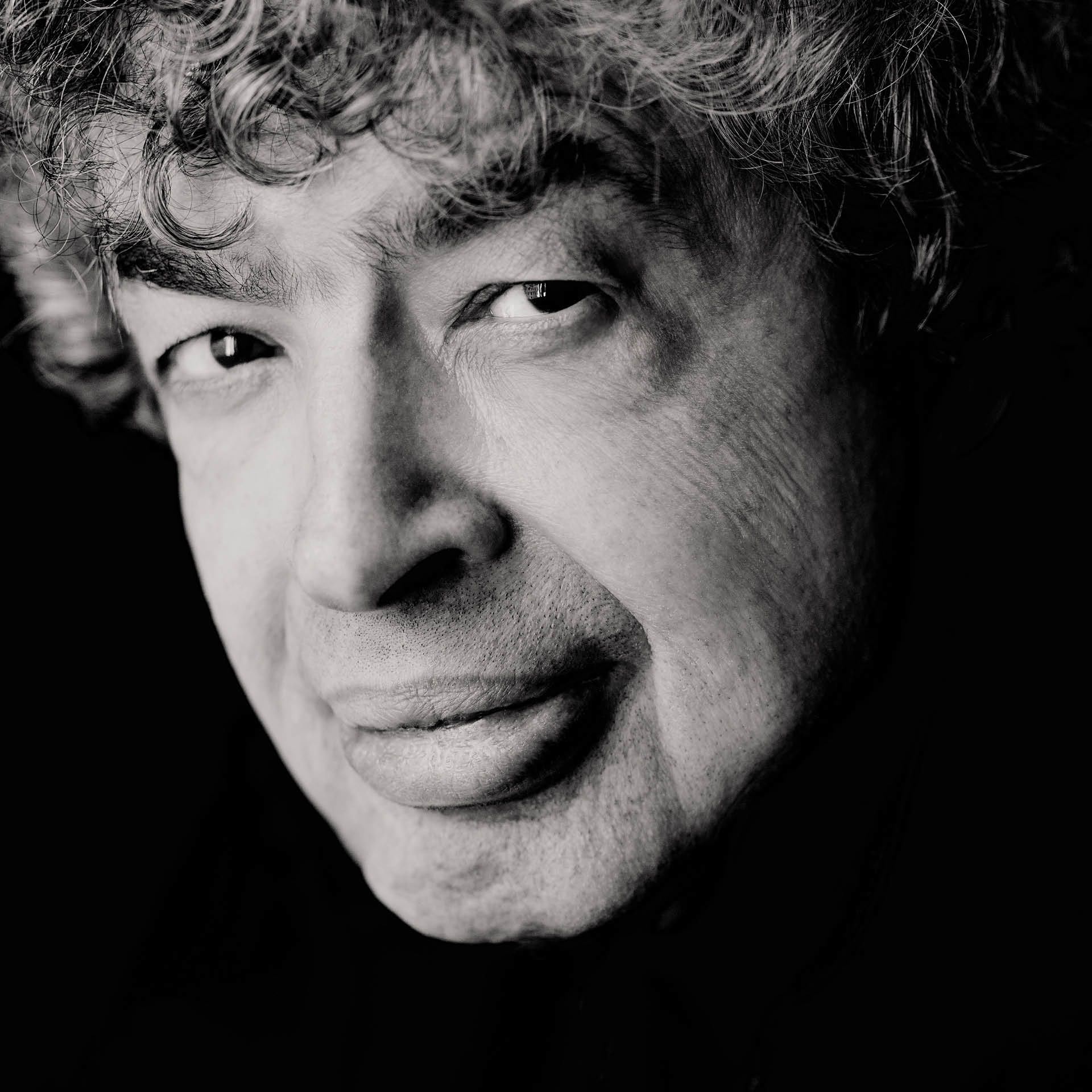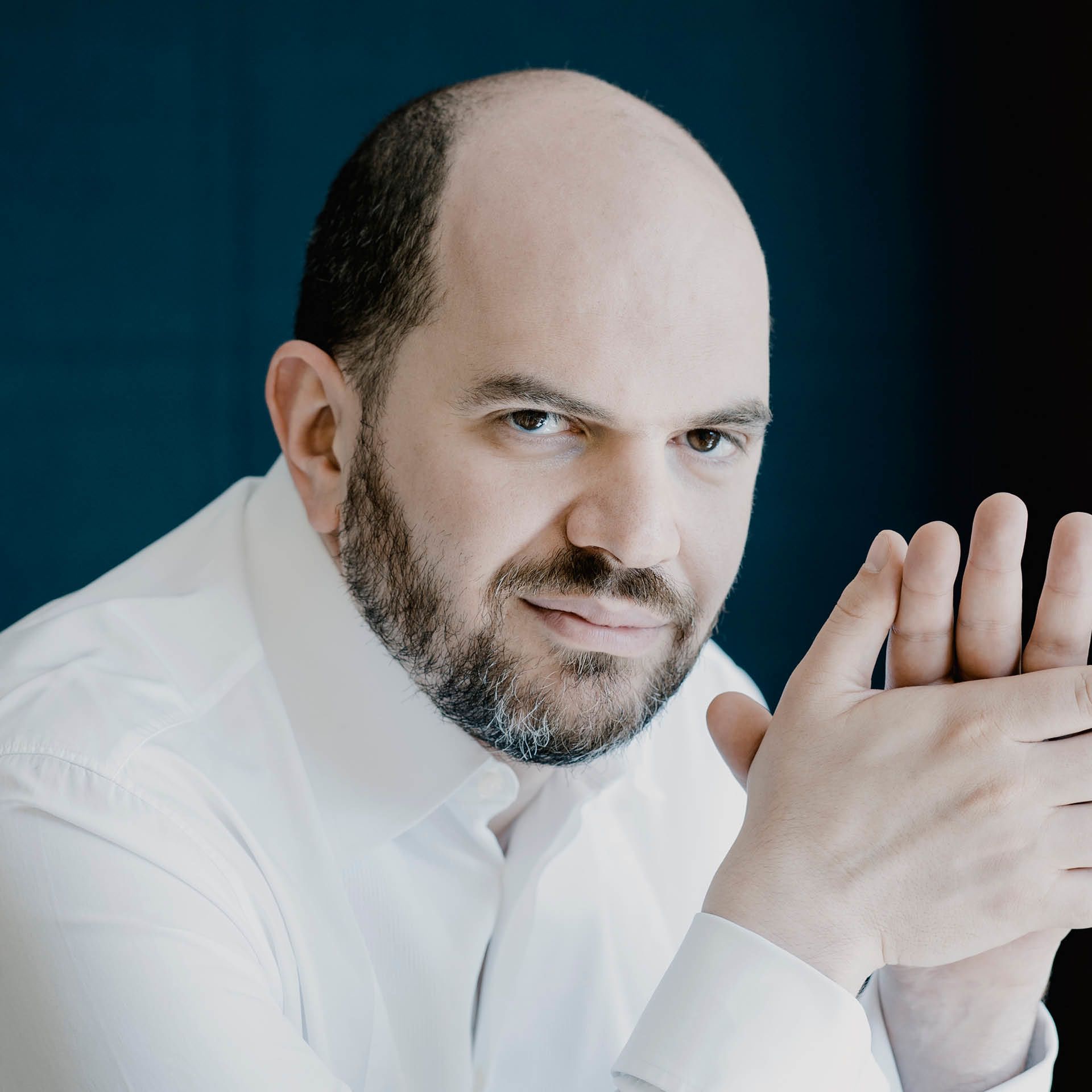Celebrating 100 years of the BBC – Dessner, Strauss, Mussorgsky
Friday 11 February 2022, 7.30pm

Bryce Dessner
Mari UK premiere 18’
Richard Strauss
Burleske for piano and orchestra 20’
INTERVAL: 20 minutes
Modest Mussorgsky, orch. Maurice Ravel
Pictures at an Exhibition 35’
Kirill Gerstein piano
BBC Symphony Orchestra
Semyon Bychkov conductor

This concert is being broadcast live by BBC Radio 3 in ‘Radio 3 in Concert’. It will be available for 30 days after broadcast via BBC Sounds, where you can also find podcasts and music mixes.
Please ensure all mobile phones and watch-alarms are turned to silent.
Help us Improve Our Online Programmes.
Please take this 5-minute survey and let us know what you think of these notes.
Programme Survey
Welcome to tonight’s concert, which is part of an entire weekend celebrating the centenary of the BBC, with concerts by the BBC Orchestras and Choirs and the Ulster Orchestra.
The BBC Symphony Orchestra is this evening conducted by longtime collaborator Semyon Bychkov and it’s fitting that we begin with a premiere, for performing new music has long been a vital strand of the BBC’s remit. Bryce Dessner’s Mari receives its UK premiere; he’s a versatile artist, winning Grammy Awards both as a classical composer and with the band The National, of which he is founding member. He is a close friend and neighbour of Bychkov, and in Mari, written in lockdown and named after the Basque goddess of the forests, he muses on the subjects of the lost sounds of the orchestra, and the beauty of nature.
Richard Strauss was a composer who started young, and his Burleske, written when he was 21, has a boldness of invention as well as a sparkling wit. Kirill Gerstein tonight takes on the formidable piano part.
We end with Mussorgsky’s Pictures at an Exhibition, a piece designed for solo piano, and written in memory of his close friend, the artist Viktor Hartmann. He was a figure who worked across different genres and in a range of styles, and you can experience that vividly in movements that by turn depict quarrelling children, the fearsome witch Baba Yaga and the grandeur conjured in the closing ‘Great Gate of Kiev’. These images are potently brought to life in Ravel’s brilliantly imaginative orchestration.
Bryce Dessner (born 1976)
Mari (2020, rev. 2021)
UK premiere

During the pandemic of 2019–21, with most of the world shut down and concerts cancelled, I thought a lot about the impermanence of many things that we imagine to be eternal. An orchestra can sometimes seem like the most lasting form of performer: most major cities have an orchestra and the masterpieces they perform seem like pillars central to our culture. But what if those orchestras never played again? What if these great works of art become but mere echoes, gradually fading from memory? These are the thoughts I had during this period when the orchestras fell silent and the musicians and audiences stayed at home. At the outer reaches of our memory would the sounds of those works combine into a kind of woven tapestry of fragments and recollections? Could it all slow down into a beautiful aquatic drone? I thought about how the act of composing – conjuring sounds from one’s mind or imagination – is very similar to this feeling: a kind of reverence for a world of music we have shared, how memories combine into something original, a spark of creativity or imagination or a dialogue with something that came before.
Semyon Bychkov, for whom this piece was written and to whom it is dedicated, lives just minutes from me on the Basque coast of France, but we did not see each other for several months during the pandemic. On many long walks through these beautiful forests and mountains I imagined him reflecting on those great pieces in his own vast repertoire and how the sounds of the forest and the quiet of the beautiful natural world might intertwine with his own musical memories.
My orchestral piece Mari is a reflection on the pastoral, and it weaves together several textures and fragments of material from historic works through a kind of abstraction and altered context to something new, most audibly a melody from the first movement of Dvořák’s ‘New World’ Symphony and textures from the fourth movement of Mahler’s sublime Symphony No. 3. My work is named after the Basque goddess of the forest, Mari.
As a concert opener, it felt appropriate to let these notes pass through my fingers and open a new doorway through which my own voice could emerge. The music of Dvořák and Mahler feels timeless but also distinctly modern, especially now as we emerge again into a new world and listen out for what comes next
Programme note © Bryce Dessner
Bryce Dessner
Composer, guitarist and curator Bryce Dessner was born in Cincinnati, Ohio, and studied at Yale University. He co-founded the ensemble Clogs in the late 1990s and later became a member of the band The National, along with his brother Aaron, the band’s co-founder.
In 2009 he wrote Aheym, commissioned by the Kronos Quartet, inspired by his grandmother, a Russian immigrant to New York. Tenebre (2011) soon followed, written to mark the 75th birthday of Steve Reich.
He has collaborated with visual artist Matthew Ritchie (The Long Count, 2009) and composers Sufjan Stevens and Nico Muhly (Planetarium, 2012), and written for choreographers Benjamin Millepied, Justin Peck and Rafael Bonachela, as well as for the ensemble Eighth Blackbird.
In 2006 he founded MusicNOW in Cincinnati, which has led to festival curation in London at the Barbican and the Cork Opera House. In 2015, alongside Ryuichi Sakamoto and Alva Noto, he composed the score for Alejandro González Iñárritu’s The Revenant. Other film scores include The Two Popes (2019) and Cyrano (2021).
He has composed three ballets and, in 2020, he scored the music – for large orchestra and choir – for the Louis Vuitton catwalk show as part of Paris Fashion Week. Recent works include his Trombone Concerto (2020) for Jörgen van Rijen and Violin Concerto (2021) for Pekka Kuusisto.
Profile © BBC
Richard Strauss (1864–1949)
Burleske (1885, rev. 1889)

Kirill Gerstein piano
Before Richard Strauss’s music became the byword for awe-inspiring cataclysm, the composer of Also sprach Zarathustra and An Alpine Symphony was fully immersed in the late 19th-century Austro-German zeitgeist. Where French composers were seeking an altogether more mellifluous musical language, his compatriots were pushing the boundaries of standard musical forms with ever grander symphonies, tone-poems and operas. Into the white heat of this relentless march of progress came the 21-year-old Strauss, taking the bold decision to parody (albeit affectionately) the titans of the day in this Burleske for piano and orchestra. Like its English equivalent, ‘Burlesque’, the title derives from the Italian word ‘burla’, meaning a jest, practical joke or prank.
The piece had something of a difficult birth. It was composed during a time when Strauss’s compositional technique was developing rapidly, and it retains a decidedly chaotic element, constantly threatening to come apart at the seams as the clichés of the canonical Romantic figures pile in. The Burleske was subsequently revised and premiered in 1890.
Anyone familiar with the musical literature of the 19th century will immediately recognise the influence of Liszt in the piano writing; it sometimes feels as if the orchestra is merely an afterthought. Another major figure we find lampooned in the Burleske is Wagner – perhaps the biggest influence on Strauss’s early musical thoughts. Fittingly, some of the more harmonically lithe sections bear a striking resemblance to the sinuous melodies of the Prelude to Tristan and Isolde.
While this work is unlikely to displace the more familiar milestones in Strauss’s output, we can nonetheless see at work the musical mind that would be able to balance the comedic genius of Der Rosenkavalier and the tragedy of Salome and Elektra.
Programme note © Elliott Park
Elliott Park is a composer of acoustic and electroacoustic music, who studied at the universities of Durham and Cambridge, and at the Royal Academy of Music.
Richard Strauss
Strauss composed from his early years (his first two published works were written when he was 10), and also developed a conducting career alongside his success in composition: 1886 saw not only the premiere of his First Horn Concerto, but also a conducting post at the Munich Court Opera. In the same year, influenced by Liszt, he produced Aus Italien, the first of a string of brilliantly orchestrated tone-poems extending through the 1890s, among them Don Juan, Till Eulenspiegel and Also sprach Zarathustra. Strauss was also inspired by Wagner, and went on to write some of the 20th century’s finest operas: in 1905 he shocked the operatic world with Salome. Elektra (1909, another fiercely powerful portrait) marked his first collaboration with the poet Hugo von Hofmannsthal, a partnership that bore four further operas, including the comedy Der Rosenkavalier (1911). His operatic output continued through the turbulence of the Nazi years, and he also wrote successful orchestral works in a generally late-Romantic idiom. He died on 8 September 1949, several months before the first performance of his Four Last Songs.
Profile by Edward Bhesania © BBC
Edward Bhesania is Editorial Manager, BBC Proms Publications, and reviews for The Stage and The Strad. He has written for The Observer, Country Life, The Tablet and International Piano.
INTERVAL: 20 MINUTES
Modest Mussorgsky (1839–81), orch Maurice Ravel (1875–1937)
Pictures at an Exhibition (1874, orch. 1922)

Promenade
1 Gnomus [Gnome]
Promenade
2 Il vecchio castello [The Old Castle]
Promenade –
3 Tuileries (Dispute d’enfants après jeux) [Quarrelling children at play]
4 Bydło [The Ox-Cart]
Promenade –
5 Ballet of the Unhatched Chicks
6 Samuel Goldenberg and Schmuÿle
7 Limoges: Le marché (La grande nouvelle) [Marketplace (Hot gossip)] –
8 Catacombae (Sepulcrum romanum) – Cum mortuis in lingua mortua [Catacombs (Roman Tomb) – With the Dead in the Language of the Dead]
9 The Hut on Hen’s Legs (Baba Yaga) –
10 The Great Gate of Kiev
Nineteenth-century Russia was not hospitable to young composers – careers in the arts were seen as ‘unfit for gentlemen’ by much of cultured society, so many aspiring composers were channelled into more ‘respectable’ careers. Into this mix entered Modest Mussorgsky, trained for public service and forced to construct his own musical education. Passionate, alcoholic and deeply insecure of his self-training in music, he died in relative obscurity aged only 42. It was only later that his highly individual output would be seen as emblematic of a uniquely Russian musical style.
Pictures at an Exhibition started life as a piano piece written in homage to an artist friend, Viktor Hartmann, who had died suddenly in 1873. Pictures is drawn from a posthumous exhibition of Hartmann’s work arranged by the influential critic Vladimir Stasov, who had been friends with both men. Today, Pictures is most often performed in Maurice Ravel’s 1922 arrangement, honouring Mussorgsky’s strange musical vision by heightening its uniqueness through masterful instrumentation.
Promenade: We begin with a striding promenade theme, irregularly rhythmic and heavy, illustrating the composer trudging sorrowfully through the gallery. Trumpets present this main theme and are joined by the full orchestra for an extended passage, the longest utterance of this theme in the entire piece.
Gnomus: Hartmann’s drawing depicts a gnome-shaped nutcracker, breaking the shells in his massive jaws. Here the music lurches, twitching from melodic segment to segment as the nutcracker’s mouth snaps and clacks.
A gentle recapitulation of the Promenade by horn and winds introduces the audience to
Il Vecchio Castello: A lonely Italian ruin. Bassoons segue into a mournful melody on the saxophone, to lute-like accompaniment from the lower strings.
Trumpets and trombones reintroduce the Promenade theme leading to
Tuileries: Winds and high strings illustrate the taunting and frolicking of children in the famous Parisian gardens.
Bydło: A heavy, plodding melody in brass depicts the painful lumbering of an ox-cart.
The Promenade returns, gently and tranquilly, in the flutes, oboes and bassoons.
This lightness leads to a sweetly fluttering depiction of dancers in eggshell costumes in Hartmann’s Ballet of the Unhatched Chicks, a strong contrast to the previous picture.
Another strong contrast comes in Samuel Goldenberg and Schmuÿle. The two Polish Jews, one rich, one poor, are satirised in the orchestral writing: the haughty patriarch in winds and strings, and the nervous beggar in stuttering trumpet sections.
This duet builds up into Limoges: Le marché, where the bustle of a market day bursts into life.
The vivaciousness dies down in Catacombae, inspired by a drawing of the catacombs beneath Paris, but transposed by Mussorgsky to the ancient Roman world, which in turn leads to a mournful re-statement of the Promenade theme. But the catacombs provide only a brief moment of rest, as the orchestra revs into demonic life with:
Baba Yaga: A frantic chase, as Mussorgsky depicts the Russian witch who lives in a hut supported on chicken’s legs. The music then swells into the grandeur of:
The Great Gate of Kiev, in which the sounds of religious chanting and the clanging of bells are interwoven with the Promenade theme, conjuring an ancient Russianness to the ear as potently as Hartmann’s image does to the eye.
Programme note © Margaret Frainier
Margaret Frainier recently earned her PhD from the University of Oxford, studying 19th-century Russian music and culture. Having worked as an opera singer, academic and teacher, she now works as a researcher for the Library of Congress in Washington, DC.
Modest Mussorgsky
For most of his lifetime, and for some time afterwards, Mussorgsky was considered something of a dilettante. In 1856 he entered a regiment of the Guards in St Petersburg and in the same year, with no training in composition, made an abortive attempt at an opera. Conscious of his inexperience, he took lessons from Balakirev, through whom he became part of the group of composers known as ‘The Five’, and as early as 1859 determined on his path as a nationalist composer. Beset by a series of misfortunes – chronic alcoholism, financial problems and his need to take on a day job – his output suffered. His vivid orchestral tone-poem Night on a Bare Mountain (1867) and his virtuosic piano suite Pictures at an Exhibition (1874, later orchestrated by Ravel, among others) are regularly performed, but his greatest achievement was in opera, despite the fact that he only managed to complete Boris Godunov (1868–9), based on Pushkin. His other major opera Khovanshchina, as well as other works, first appeared posthumously, heavily edited by Rimsky-Korsakov.
Profile by Edward Bhesania © BBC
Coming up at the Barbican
Friday 18 February 2022, 7.30pm
Sir Andrew Davis’s Half Century
Celebrating 50 years of collaboration with the BBC SO, Conductor Laureate Sir Andrew Davis pairs works by two 20th-century giants, Alban Berg and Sergey Rachmaninov.
Book tickets

Biographies
Semyon Bychkov conductor

Photo: Marco Borggreve
Photo: Marco Borggreve
Semyon Bychkov is Chief Conductor and Music Director of the Czech Philharmonic Orchestra. Following the completion of their Tchaikovsky Project, they are now focusing on a Mahler symphony recording cycle. In March they go on tour to present Smetana’s Má vlast in Vienna, Berlin, Hamburg and at the Barbican.
In addition to his reputation in core repertoire, Bychkov has also worked with many leading 20th-century composers, including Berio, Dutilleux and Kagel. Recent highlights include premieres of new works by Thomas Larcher, Bryce Dessner and Julian Anderson – three of 14 composers commissioned by Bychkov at the start of his tenure with the Czech Philharmonic.
Alongside concerts in Prague and on tour with the Czech Philharmonic, he conducts the major orchestras across Europe and the USA including the Berlin, Munich, New York and Vienna Philharmonic orchestras, the Leipzig Gewandhaus, Royal Concertgebouw and Cleveland orchestras and the Orchestra dell’Accademia Nazionale di Santa Cecilia, Rome. He is a regular guest at the world’s leading operas houses, including the Royal Opera House, Covent Garden, Madrid’s Teatro Real, the Vienna State Opera and Bayreuth Festival.
In the UK, he holds the Günter Wand Conducting Chair at the BBC Symphony Orchestra, with which he appears every year at the BBC Proms; he also holds the Otto Klemperer Chair of Conducting at the Royal Academy of Music.
He has an extensive and award-winning discography that includes works by Brahms, Glanert, York Höller, Rachmaninov, Schmidt, Shostakovich, Strauss, Tchaikovsky, Verdi and Wagner. His 1992 recording of Tchaikovsky’s Eugene Onegin was BBC’s Radio 3’s Building a Library recommended recording (2020); Wagner’s Lohengrin was BBC Music Magazine’s Record of the Year (2010); and Schmidt’s Symphony No. 2 with the Vienna Philharmonic was BBC Music Magazine’s Record of the Month (2018).
He was born in St Petersburg and studied piano at the Glinka Choir School and conducting at the Leningrad Conservatory under Ilya Musin. He won the Rachmaninov Conducting Competition at the age of 20 and two years later emigrated to the USA. He was Music Director of the Orchestre de Paris (1989–98) and Chief Conductor of the WDR Symphony Orchestra, Cologne (1997–2010) and the Dresden Semperoper (1998–2003). In 2015 he was named Conductor of the Year at the International Opera Awards.
Kirill Gerstein piano

Kirill Gerstein was born in 1979 in Voronezh, Russia, and attended one of the country’s specialist music schools for gifted children. Following a chance encounter with jazz musician Gary Burton when he was 14, he became the youngest student to attend the Berklee College of Music in Boston, where he studied jazz and classical piano. He later studied with Solomon Mikowsky at the Manhattan School of Music, Dmitri Bashkirov in Madrid and Ferenc Rados in Budapest. He is now an American citizen based in Berlin and is on the faculty of the Kronberg Academy and a professor of piano at Berlin’s Hanns Eisler Hochschule. Under the auspices of the Kronberg Academy, he gives free online seminars that feature conversations with leading musicians, artists, and thinkers.
He has worked with the major orchestras in Europe and the USA, and regularly gives recitals in London, Berlin, Vienna, Paris and New York. Over the past year, his association with Thomas Adès has resulted in the release of two recordings: the world premiere of Adès’s Piano Concerto (which won a Gramophone Award) and a compendium of his piano works. In May 2021, he gave the world premiere of Thomas Larcher’s Piano Concerto, commissioned for him by the Berlin and Czech Philharmonic orchestras, the Netherlands Radio Philharmonic and the Vienna Konzerthaus.
His latest release is a recording of Mozart’s sonatas for four hands, performed with his longstanding mentor Ferenc Rados. Other highlights in his discography include Richard Strauss’s Enoch Arden with the late Bruno Ganz; Busoni’s Piano Concerto with the Boston Symphony Orchestra under Sakari Oramo; The Gershwin Moment with the St Louis Symphony, David Robertson, Gary Burton and Storm Large; Scriabin with the Oslo Philharmonic and Vasily Petrenko; and Tchaikovsky with Semyon Bychkov and the Czech Philharmonic.
Gerstein was the sixth recipient of the Gilmore Artist Award, First Prize winner at the 10th Arthur Rubinstein Competition and an Avery Fisher Career Grant. In May 2021 he was awarded an honorary doctorate by the Manhattan School of Music.
BBC Symphony Orchestra
The BBC Symphony Orchestra has been at the heart of British musical life since it was founded in 1930. It plays a central role in the BBC Proms at the Royal Albert Hall, performing at the First and Last Night each year in addition to regular appearances throughout the Proms season with the world’s leading conductors and soloists.
The BBC SO performs an annual season of concerts at the Barbican in London, where it is Associate Orchestra. Its commitment to contemporary music is demonstrated by a range of premieres each season, as well as Total Immersion days devoted to specific composers or themes.
Highlights of the current season include concerts conducted by Sakari Oramo with music by Beethoven, Brahms, Ruth Gipps, Dora Pejačević, Sibelius and others; performances with Principal Guest Conductor Dalia Stasevska, including the devised work Concerto No. 1: SERMON by Davóne Tines, combining music and poetry in a unique examination of racial justice; children’s author Jacqueline Wilson reading from her best-selling books in a family concert; the world premiere of Up For Grabs by composer and Arsenal fanatic Mark-Anthony Turnage; the BBC Symphony Chorus’s return to the Barbican stage for a Christmas concert; a performance with Jules Buckley and Canadian singer-songwriter Patrick Watson; concerts celebrating the 100th anniversary of the BBC and a half century of collaboration with Sir Andrew Davis, and two Total Immersion days, one focusing on music composed in the camps and ghettos of Nazi-occupied Europe and one featuring the music of Frank Zappa. Guest conductors include Alpesh Chauhan, Eva Ollikainen, Jukka-Pekka Saraste, Jordan de Souza and Nathalie Stutzmann.
The vast majority of performances are broadcast on BBC Radio 3 and a number of studio recordings each season are free to attend. These often feature up-and-coming new talent, including members of BBC Radio 3’s New Generation Artists scheme. All broadcasts are available for 30 days on BBC Sounds and the BBC SO can also be seen on BBC TV and BBC iPlayer and heard on the BBC’s online archive, Experience Classical.
The BBC Symphony Orchestra and Chorus – alongside the BBC Concert Orchestra, BBC Singers and BBC Proms – also offer enjoyable and innovative education and community activities and take a leading role in the BBC Ten Pieces and BBC Young Composer programmes.
Chief Conductor
Sakari Oramo
Principal Guest Conductor
Dalia Stasevska
Günter Wand Conducting Chair
Semyon Bychkov
Conductor Laureate
Sir Andrew Davis
Creative Artist in Association
Jules Buckley
First Violins
Stephen Bryant leader
Cellerina Park
Jeremy Martin
Jenny King
Celia Waterhouse
Colin Huber
Shirley Turner
Ni Do
Molly Cockburn
Amanda Smith
Thea Spiers
Katharina Paul
Joanne Chen
Rebecca Dinning
Second Violins
Heather Hohmann
Daniel Meyer
Sebastian Canellis
Vanessa Hughes
Danny Fajardo
Tammy Se
Caroline Cooper
Victoria Hodgson
Lucica Trita
Jack Greed
Raja Halder
Julia Watkins
Violas
Rachel Roberts
Philip Hall
Joshua Hayward
Nikos Zarb
Audrey Henning
Natalie Taylor
Michael Leaver
Carolyn Scott
Mary Whittle
Peter Mallinson
Matthias Wiesner
Cellos
Jonathan Aasgaard
Tamsy Kaner
Graham Bradshaw
Mark Sheridan
Clare Hinton
Sarah Hedley Miller
Michael Atkinson
Augusta Harris
Morwenna Del Mar
Double Basses
Tim Gibbs
Richard Alsop
Michael Clarke
Beverley Jones
Josie Ellis
Elen Pan
Flutes
Daniel Pailthorpe
Tomoka Mukai
Piccolo
Fergus Davidson
Oboes
Tom Blomfield
Rachel Ingleton
Cor anglais
Ben Marshall
Clarinets
James Burke
Marie Lloyd
Bass Clarinet
Thomas Lessels
Soprano Saxophone
Martin Robertson
Bassoons
Emily Hultmark
Ruth Rosales
Contrabassoon
Steven Magee
Horns
Martin Owen
Michael Murray
Andrew Antcliff
Nicholas Hougham
Mark Wood
Trumpets
Philip Cobb
Dave Carstairs
Tom Watson
Paul Mayes
Trombones
Duncan Wilson
Dan Jenkins
Bass Trombone
Robert O’Neill
Tuba
Sam Elliott
Timpani
Antoine Bedewi
Percussion
David Hockings
Alex Neal
Joe Cooper
Joe Richards
Tim Palmer
Harps
Louise Martin
Manon Morris
Celesta
Elizabeth Burley
The list of players was correct at the time of publication

